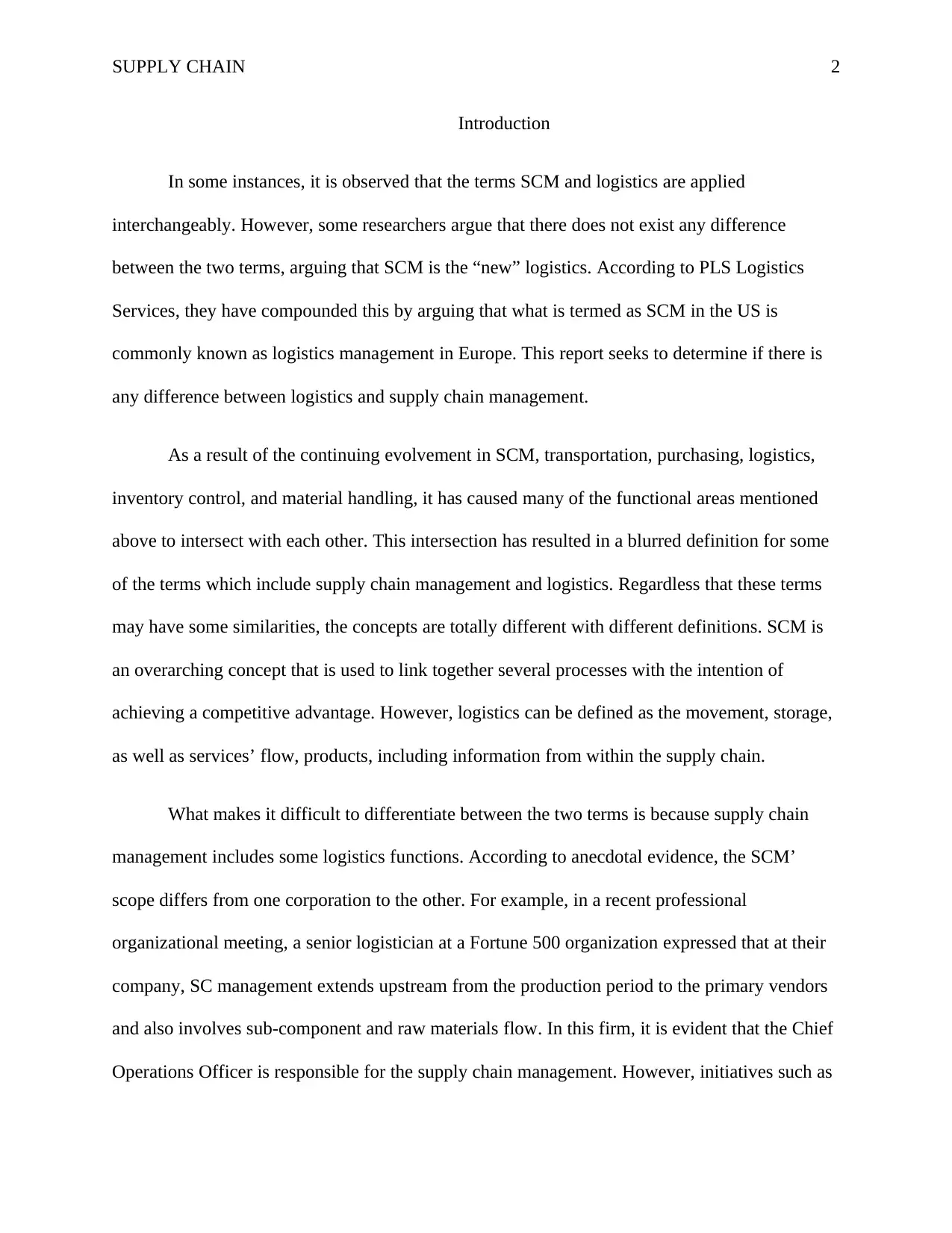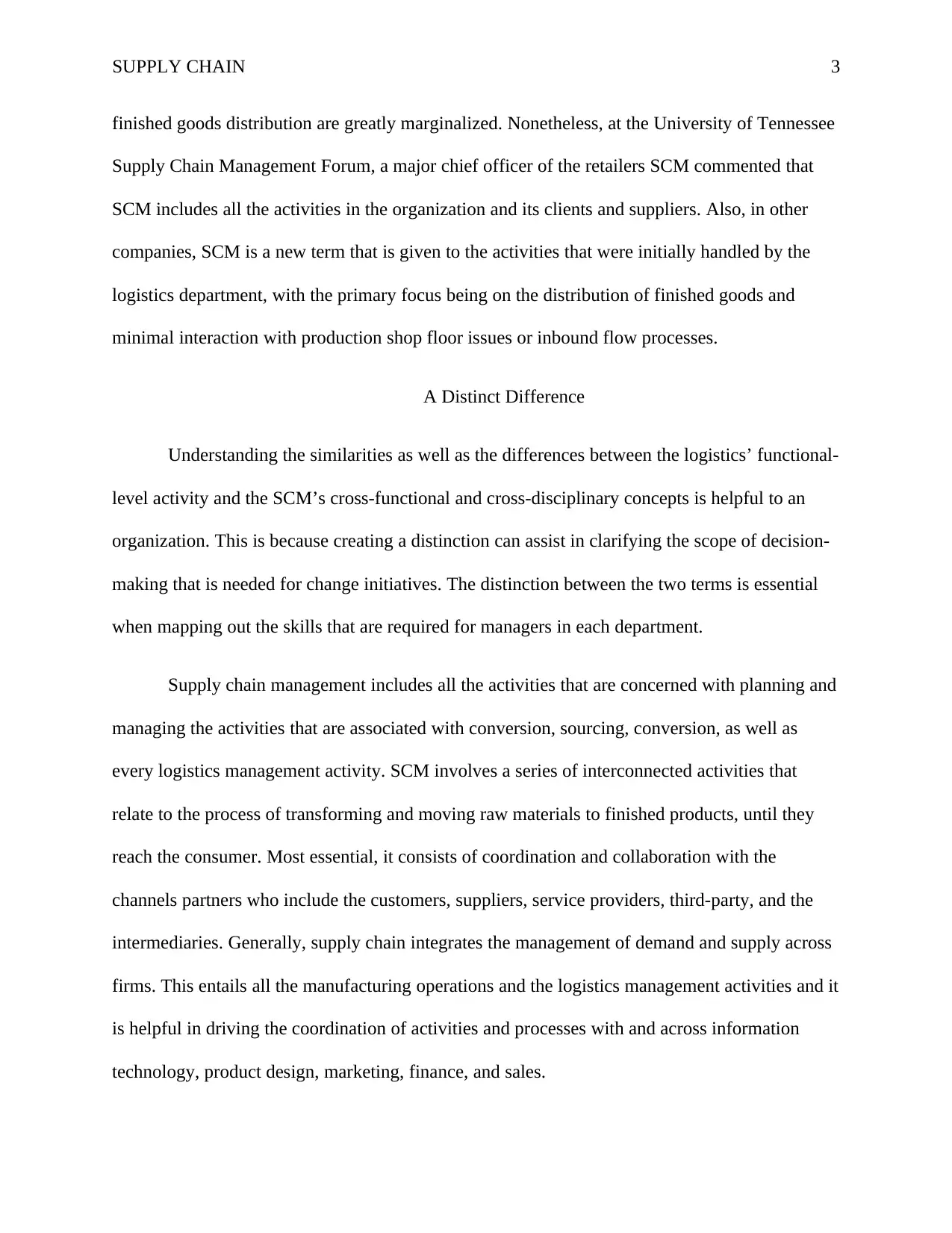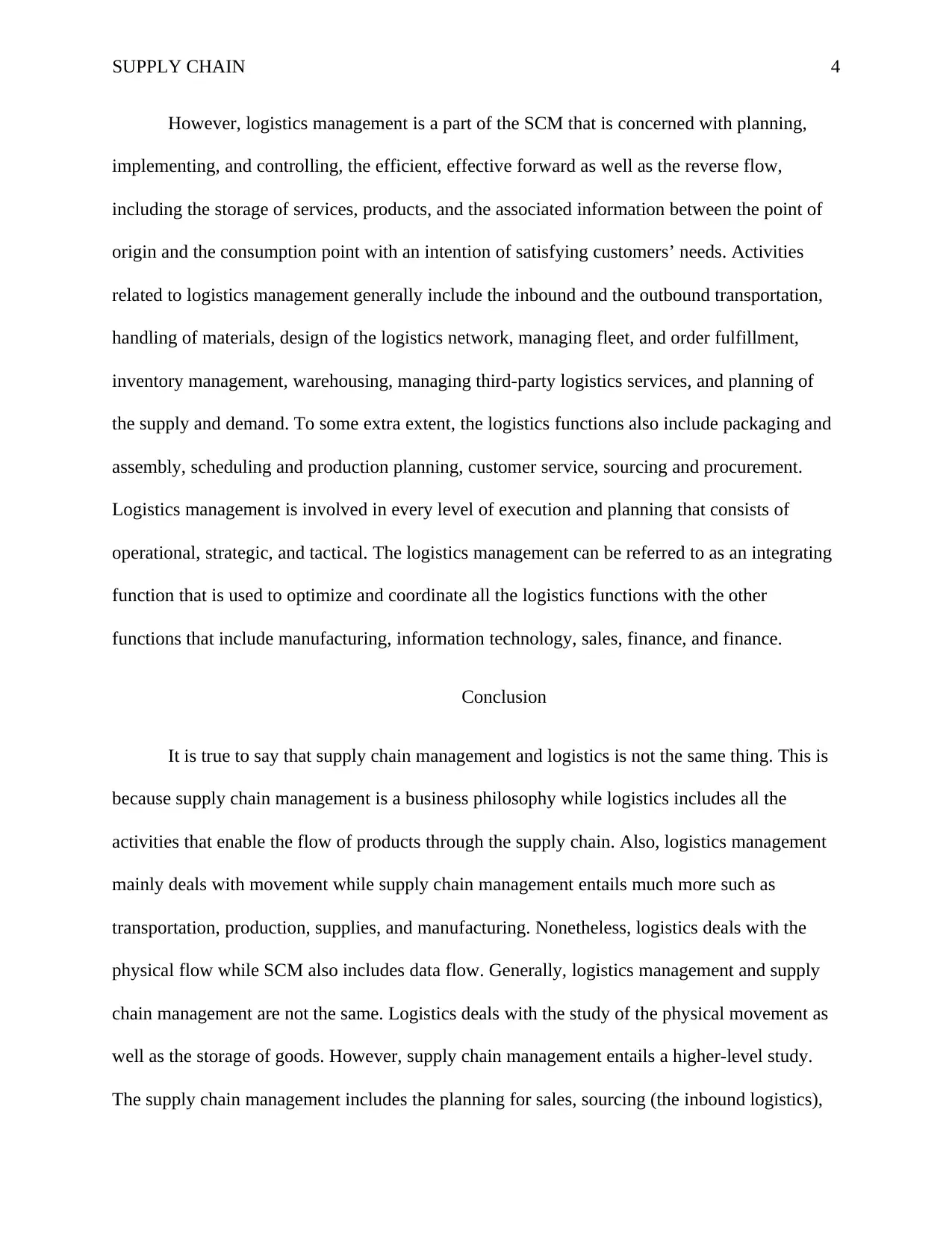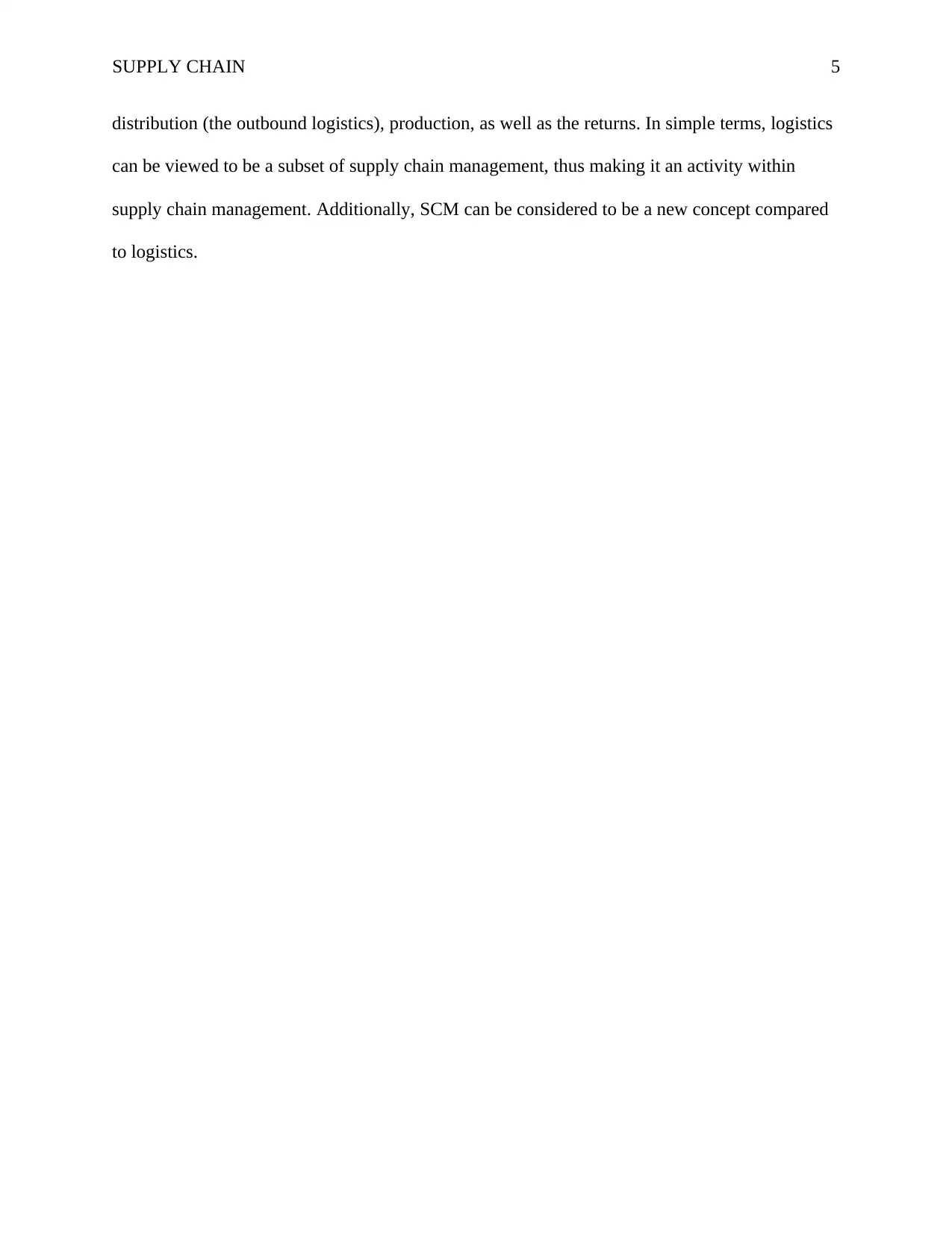Comparative Analysis: Unveiling Logistics and Supply Chain Management
VerifiedAdded on 2023/06/04
|5
|1062
|222
Report
AI Summary
This report examines the differences between logistics and supply chain management (SCM), clarifying that while the terms are sometimes used interchangeably, they represent distinct concepts. SCM is described as an overarching business philosophy linking various processes to achieve a competitive advantage, whereas logistics is defined as the movement, storage, and flow of products, services, and information within the supply chain. The report highlights that SCM encompasses logistics functions and integrates demand and supply management across firms, including manufacturing, IT, marketing, and sales. Logistics management, a part of SCM, focuses on planning, implementing, and controlling the efficient flow of goods and information from origin to consumption. Ultimately, the report concludes that logistics is a subset of SCM, dealing with the physical movement and storage of goods, while SCM involves higher-level planning and coordination across the entire supply chain.

Running head: SUPPLY CHAIN 1
Supply Chain
Name:
Institution
Supply Chain
Name:
Institution
Paraphrase This Document
Need a fresh take? Get an instant paraphrase of this document with our AI Paraphraser

SUPPLY CHAIN 2
Introduction
In some instances, it is observed that the terms SCM and logistics are applied
interchangeably. However, some researchers argue that there does not exist any difference
between the two terms, arguing that SCM is the “new” logistics. According to PLS Logistics
Services, they have compounded this by arguing that what is termed as SCM in the US is
commonly known as logistics management in Europe. This report seeks to determine if there is
any difference between logistics and supply chain management.
As a result of the continuing evolvement in SCM, transportation, purchasing, logistics,
inventory control, and material handling, it has caused many of the functional areas mentioned
above to intersect with each other. This intersection has resulted in a blurred definition for some
of the terms which include supply chain management and logistics. Regardless that these terms
may have some similarities, the concepts are totally different with different definitions. SCM is
an overarching concept that is used to link together several processes with the intention of
achieving a competitive advantage. However, logistics can be defined as the movement, storage,
as well as services’ flow, products, including information from within the supply chain.
What makes it difficult to differentiate between the two terms is because supply chain
management includes some logistics functions. According to anecdotal evidence, the SCM’
scope differs from one corporation to the other. For example, in a recent professional
organizational meeting, a senior logistician at a Fortune 500 organization expressed that at their
company, SC management extends upstream from the production period to the primary vendors
and also involves sub-component and raw materials flow. In this firm, it is evident that the Chief
Operations Officer is responsible for the supply chain management. However, initiatives such as
Introduction
In some instances, it is observed that the terms SCM and logistics are applied
interchangeably. However, some researchers argue that there does not exist any difference
between the two terms, arguing that SCM is the “new” logistics. According to PLS Logistics
Services, they have compounded this by arguing that what is termed as SCM in the US is
commonly known as logistics management in Europe. This report seeks to determine if there is
any difference between logistics and supply chain management.
As a result of the continuing evolvement in SCM, transportation, purchasing, logistics,
inventory control, and material handling, it has caused many of the functional areas mentioned
above to intersect with each other. This intersection has resulted in a blurred definition for some
of the terms which include supply chain management and logistics. Regardless that these terms
may have some similarities, the concepts are totally different with different definitions. SCM is
an overarching concept that is used to link together several processes with the intention of
achieving a competitive advantage. However, logistics can be defined as the movement, storage,
as well as services’ flow, products, including information from within the supply chain.
What makes it difficult to differentiate between the two terms is because supply chain
management includes some logistics functions. According to anecdotal evidence, the SCM’
scope differs from one corporation to the other. For example, in a recent professional
organizational meeting, a senior logistician at a Fortune 500 organization expressed that at their
company, SC management extends upstream from the production period to the primary vendors
and also involves sub-component and raw materials flow. In this firm, it is evident that the Chief
Operations Officer is responsible for the supply chain management. However, initiatives such as

SUPPLY CHAIN 3
finished goods distribution are greatly marginalized. Nonetheless, at the University of Tennessee
Supply Chain Management Forum, a major chief officer of the retailers SCM commented that
SCM includes all the activities in the organization and its clients and suppliers. Also, in other
companies, SCM is a new term that is given to the activities that were initially handled by the
logistics department, with the primary focus being on the distribution of finished goods and
minimal interaction with production shop floor issues or inbound flow processes.
A Distinct Difference
Understanding the similarities as well as the differences between the logistics’ functional-
level activity and the SCM’s cross-functional and cross-disciplinary concepts is helpful to an
organization. This is because creating a distinction can assist in clarifying the scope of decision-
making that is needed for change initiatives. The distinction between the two terms is essential
when mapping out the skills that are required for managers in each department.
Supply chain management includes all the activities that are concerned with planning and
managing the activities that are associated with conversion, sourcing, conversion, as well as
every logistics management activity. SCM involves a series of interconnected activities that
relate to the process of transforming and moving raw materials to finished products, until they
reach the consumer. Most essential, it consists of coordination and collaboration with the
channels partners who include the customers, suppliers, service providers, third-party, and the
intermediaries. Generally, supply chain integrates the management of demand and supply across
firms. This entails all the manufacturing operations and the logistics management activities and it
is helpful in driving the coordination of activities and processes with and across information
technology, product design, marketing, finance, and sales.
finished goods distribution are greatly marginalized. Nonetheless, at the University of Tennessee
Supply Chain Management Forum, a major chief officer of the retailers SCM commented that
SCM includes all the activities in the organization and its clients and suppliers. Also, in other
companies, SCM is a new term that is given to the activities that were initially handled by the
logistics department, with the primary focus being on the distribution of finished goods and
minimal interaction with production shop floor issues or inbound flow processes.
A Distinct Difference
Understanding the similarities as well as the differences between the logistics’ functional-
level activity and the SCM’s cross-functional and cross-disciplinary concepts is helpful to an
organization. This is because creating a distinction can assist in clarifying the scope of decision-
making that is needed for change initiatives. The distinction between the two terms is essential
when mapping out the skills that are required for managers in each department.
Supply chain management includes all the activities that are concerned with planning and
managing the activities that are associated with conversion, sourcing, conversion, as well as
every logistics management activity. SCM involves a series of interconnected activities that
relate to the process of transforming and moving raw materials to finished products, until they
reach the consumer. Most essential, it consists of coordination and collaboration with the
channels partners who include the customers, suppliers, service providers, third-party, and the
intermediaries. Generally, supply chain integrates the management of demand and supply across
firms. This entails all the manufacturing operations and the logistics management activities and it
is helpful in driving the coordination of activities and processes with and across information
technology, product design, marketing, finance, and sales.
⊘ This is a preview!⊘
Do you want full access?
Subscribe today to unlock all pages.

Trusted by 1+ million students worldwide

SUPPLY CHAIN 4
However, logistics management is a part of the SCM that is concerned with planning,
implementing, and controlling, the efficient, effective forward as well as the reverse flow,
including the storage of services, products, and the associated information between the point of
origin and the consumption point with an intention of satisfying customers’ needs. Activities
related to logistics management generally include the inbound and the outbound transportation,
handling of materials, design of the logistics network, managing fleet, and order fulfillment,
inventory management, warehousing, managing third-party logistics services, and planning of
the supply and demand. To some extra extent, the logistics functions also include packaging and
assembly, scheduling and production planning, customer service, sourcing and procurement.
Logistics management is involved in every level of execution and planning that consists of
operational, strategic, and tactical. The logistics management can be referred to as an integrating
function that is used to optimize and coordinate all the logistics functions with the other
functions that include manufacturing, information technology, sales, finance, and finance.
Conclusion
It is true to say that supply chain management and logistics is not the same thing. This is
because supply chain management is a business philosophy while logistics includes all the
activities that enable the flow of products through the supply chain. Also, logistics management
mainly deals with movement while supply chain management entails much more such as
transportation, production, supplies, and manufacturing. Nonetheless, logistics deals with the
physical flow while SCM also includes data flow. Generally, logistics management and supply
chain management are not the same. Logistics deals with the study of the physical movement as
well as the storage of goods. However, supply chain management entails a higher-level study.
The supply chain management includes the planning for sales, sourcing (the inbound logistics),
However, logistics management is a part of the SCM that is concerned with planning,
implementing, and controlling, the efficient, effective forward as well as the reverse flow,
including the storage of services, products, and the associated information between the point of
origin and the consumption point with an intention of satisfying customers’ needs. Activities
related to logistics management generally include the inbound and the outbound transportation,
handling of materials, design of the logistics network, managing fleet, and order fulfillment,
inventory management, warehousing, managing third-party logistics services, and planning of
the supply and demand. To some extra extent, the logistics functions also include packaging and
assembly, scheduling and production planning, customer service, sourcing and procurement.
Logistics management is involved in every level of execution and planning that consists of
operational, strategic, and tactical. The logistics management can be referred to as an integrating
function that is used to optimize and coordinate all the logistics functions with the other
functions that include manufacturing, information technology, sales, finance, and finance.
Conclusion
It is true to say that supply chain management and logistics is not the same thing. This is
because supply chain management is a business philosophy while logistics includes all the
activities that enable the flow of products through the supply chain. Also, logistics management
mainly deals with movement while supply chain management entails much more such as
transportation, production, supplies, and manufacturing. Nonetheless, logistics deals with the
physical flow while SCM also includes data flow. Generally, logistics management and supply
chain management are not the same. Logistics deals with the study of the physical movement as
well as the storage of goods. However, supply chain management entails a higher-level study.
The supply chain management includes the planning for sales, sourcing (the inbound logistics),
Paraphrase This Document
Need a fresh take? Get an instant paraphrase of this document with our AI Paraphraser

SUPPLY CHAIN 5
distribution (the outbound logistics), production, as well as the returns. In simple terms, logistics
can be viewed to be a subset of supply chain management, thus making it an activity within
supply chain management. Additionally, SCM can be considered to be a new concept compared
to logistics.
distribution (the outbound logistics), production, as well as the returns. In simple terms, logistics
can be viewed to be a subset of supply chain management, thus making it an activity within
supply chain management. Additionally, SCM can be considered to be a new concept compared
to logistics.
1 out of 5
Related Documents
Your All-in-One AI-Powered Toolkit for Academic Success.
+13062052269
info@desklib.com
Available 24*7 on WhatsApp / Email
![[object Object]](/_next/static/media/star-bottom.7253800d.svg)
Unlock your academic potential
Copyright © 2020–2026 A2Z Services. All Rights Reserved. Developed and managed by ZUCOL.





